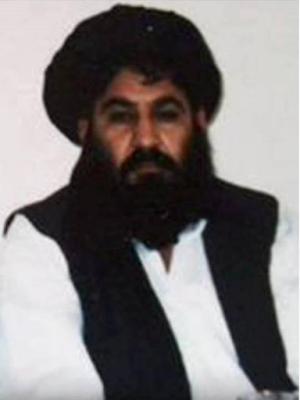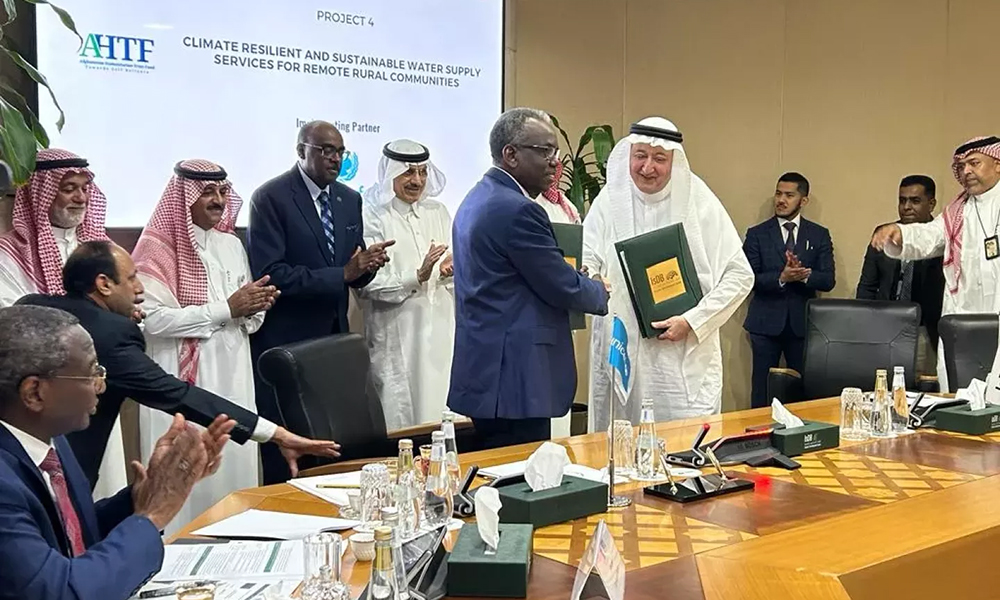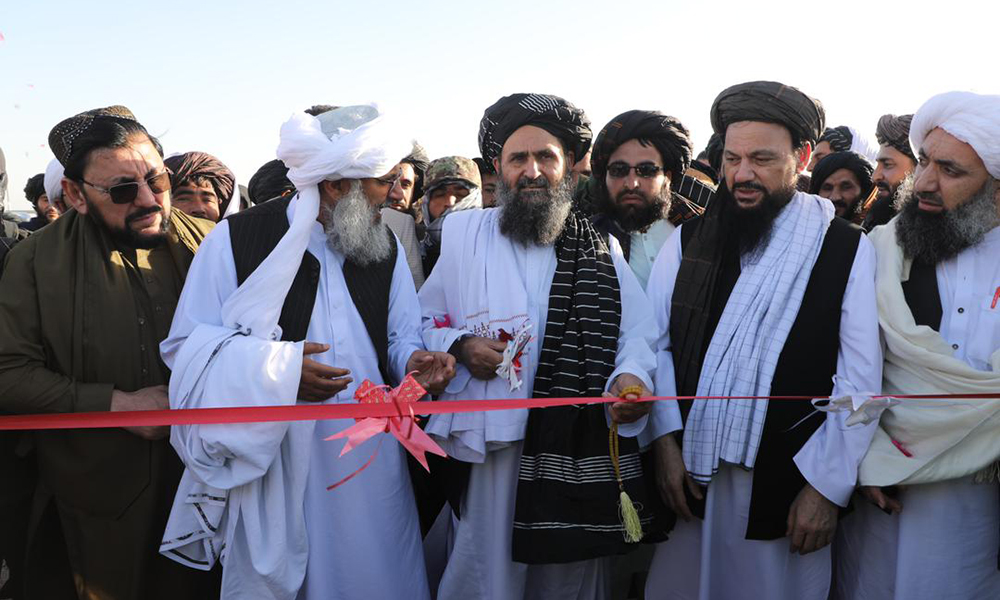Latest News
‘I’m alive’: Afghan Taliban issue message from ‘leader’

(AFP) – The Afghan Taliban released an audio message Saturday it said was from leader Mullah Akhtar Mansour, vehemently rejecting reports of his death in a firefight with his own commanders as “enemy propaganda”.
The 16-minute file said those “rumours” had been deliberately planted to weaken the Taliban, which has seen a new resurgence under the firebrand supremo despite its internal divisions.
“I have recorded this message to let everyone know that I am alive,” the man purported to be Mansour says in a relaxed drawl.
Multiple reports citing intelligence and insurgent sources had stated that Mansour was wounded or killed on Tuesday in a firefight at an insurgent gathering in Kuchlak.
“I didn’t have a fight with anyone, no meeting was held and I have not been to Kuchlak (near Quetta in Pakistan) in years. This is all enemy propaganda,” the message added.
The clip, emailed to media by a Taliban spokesman, comes after days of fevered speculation about the fate of Mansour, who was elected leader just four months ago in a bitter power succession.
The voice in the clip could not be independently verified by AFP while some militant commanders said it appeared to be that of Mansour.
But government spokesman Sultan Faizi, who sparked a flurry of reactions when he tweeted on Friday that Mansour was dead, said it was not certain the audio message was from him.
“We will do our assessment,” he said in a new tweet.
The Taliban, which saw its first formal split last month, had appeared anxious to quell speculation about Mansour’s death as it grapples with simmering divisions inside the movement.
Vehement denials by the Islamist group of any shoot-out had fallen on sceptical ears, especially after they kept the death of longtime chief Mullah Omar secret for two years.
“The Taliban is suffering from a credibility crisis after they admitted to hiding Omar’s death,” Kabul-based military analyst Jawed Kohistani told AFP.
– Deep rifts –
Mansour was declared Taliban leader on July 31 after the insurgents confirmed the death of Omar, who led the Islamist movement for about two decades.
But splits immediately emerged in the group, with some top leaders refusing to pledge allegiance to Mansour, saying the process to select him was rushed and even biased.
Many were also unhappy that Omar’s death had been kept secret for two years — during which time annual Eid statements were issued in his name.
A breakaway faction of the Taliban led by Mullah Mohamed Rasool was formed last month, in the first formal division in the once-unified group.
But Mansour’s group has seen a resurgence in recent months, opening new battlefronts across the country with Afghan forces struggling to beat back the expanding insurgency.
They briefly captured the strategic northern city of Kunduz in September in their most spectacular victory in 14 years and opened new battlefronts across the country.
Speculation about Mansour’s death has also threatened to derail a renewed regional push to jump-start peace talks with the Taliban.
Mansour is believed to be a proponent of talks with Afghan authorities, a deeply contentious issue that has prompted much rancour within hardline insurgent ranks.
Pakistan, which wields considerable influence over the militants, hosted a historic first round of peace negotiations in July.
But the dialogue process stalled soon after Omar’s death was announced.
The United States and China have been pushing for the process to restart, but frosty ties between Islamabad and Kabul have been hampering those efforts.

Latest News
Minister of mines says minerals must be processed in Afghanistan before exported

Acting Minister of Mines and Petroleum Shehabuddin Delawar has said in a meeting with officials of a Chinese company that the export of raw minerals for processing abroad is no longer allowed.
He said the ministry will work with foreign mining companies as long as they also process the minerals in Afghanistan.
Delawar said this during a meeting with China’s state-owned company MCC Holoda, and Chinese officials from the company contracted to extract copper from Mes Aynak.
The Ministry of Mines and Petroleum said in a statement that MCC Holoda is one of the largest mining and processing companies in China for copper, lead and zinc.
According to the statement, the company has expressed an interest in investing in copper, lead and zinc mines in Afghanistan.
Delawar welcomed their interest and said there are lead and zinc mines in Bamyan, Kandahar and Ghor provinces, and if the company agrees to process minerals inside Afghanistan, the ministry will cooperate with it.
Delawar also discussed the Mes Aynak copper project and called for acceleration of work at the mine.
Latest News
Afghanistan Humanitarian Trust Fund report highlights problems tackled

Mohammad Jamal Alsaati, Special Advisor to IsDB President and IsDB Coordinator for Afghanistan Humanitarian Trust Fund (AHTF), said this week that 14 projects, signed in 2023, have materialized at a total cost of $35.35 million.
He said in a statement issued Sunday that of this, $24.14 was from contributions from AHTF with a further $12.21 million provided by implementing partners and other international organizations.
Alsaati said all the services provided have created job and capacity building opportunities for the people of Afghanistan and that as of March 2024, pledges to the fund totaled almost $35 million, with more funding expected.
Alsaati’s comments were in a statement issued by the Islamic Development Bank, (IsDB), after it released the first comprehensive report on the achievements of the AHTF.
The report highlights the coordinated efforts by the IsDB, its partners, and stakeholders towards “Promoting Self Reliance and Resilience” in Afghanistan.
The AHTF’s mission is to provide initial humanitarian aid but then to prioritize development and self-reliance to move beyond emergency assistance – promoting reconstruction, empowerment and sustainable development.
IsDB President and Group Chairman, Muhammad Al Jasser meanwhile said following the release of the report that after receiving generous contributions, the AHTF “sprung into action, delivering essential aid to Afghanistan’s most vulnerable communities.”
He said the fund was able to tackle food insecurity, offer child nutrition programs, provide healthcare, innovative education, clean water, sanitation and hygiene services.
“Our projects are making a tangible difference on the ground,” Jasser said.
The Secretary General of the Organization of Islamic Cooperation (OIC), Hissein Brahim Taha also reacted to the report and said: “We are very pleased to see several humanitarian and development-focused projects are underway in Afghanistan – driven by the IsDB in collaboration with its regional and global partners.
“But much work still lies ahead, so we look forward to further help and support from our Member States, in addition to continued financial assistance for the AHTF from international aid and relief agencies,” said Taha.
The fund was established at a Council of Foreign Ministers of the OIC on 19th December 2021.
Latest News
Baradar visits Pashdan Dam, as work on project resumes

Mullah Abdul Ghani Baradar, deputy prime minister for economic affairs, has said the Pashdan Dam in Herat province is a key national project that the Islamic Emirate is committed to completing as soon as possible.
Speaking at an event marking the resumption of construction on this hydroelectric dam, which was started more than 10 years ago, Baradar said building dams was a priority for the Islamic Emirate.
Once complete the Pashdam Dam will not only generate electricity but also irrigate about 65,000 hectares of agricultural land, in turn providing work to thousands of people.
The dam will cost an estimated $117 million once finished and according to officials, at least 85% of work has been completed.
Officials expect the dam to be operational by the end of this solar year.
The construction of Pashdan Dam is being carried out by a domestic company in cooperation with an Azerbaijani company.
Engineers said the dam will mostly be used for agriculture purposes and for potable water. They also said about 73 kms of canals will be built to irrigate land.
This dam will store 54 million cubic meters of water. Currently, about 400 people are employed to work on the project.
-

 Sport3 days ago
Sport3 days agoAfghanistan beat Iraq 5-3, inch closer to Futsal World Cup berth
-

 Regional3 days ago
Regional3 days agoNew UK sanctions target Iranian drone industry
-

 Regional5 days ago
Regional5 days agoTurkey accuses U.S. of double standards over Gaza in rights report
-

 Latest News4 days ago
Latest News4 days agoEU allocates 17 million euros to support Afghans on the move
-

 Latest News3 days ago
Latest News3 days agoPakistan extends registered Afghan refugees’ stay till June 30
-

 World4 days ago
World4 days agoUS student protests over Gaza intensify despite arrests
-

 Regional3 days ago
Regional3 days agoChina to host Hamas, Fatah for Palestinian unity talks
-

 Sport1 day ago
Sport1 day agoAfghanistan qualify for FIFA Futsal World Cup for first time ever















